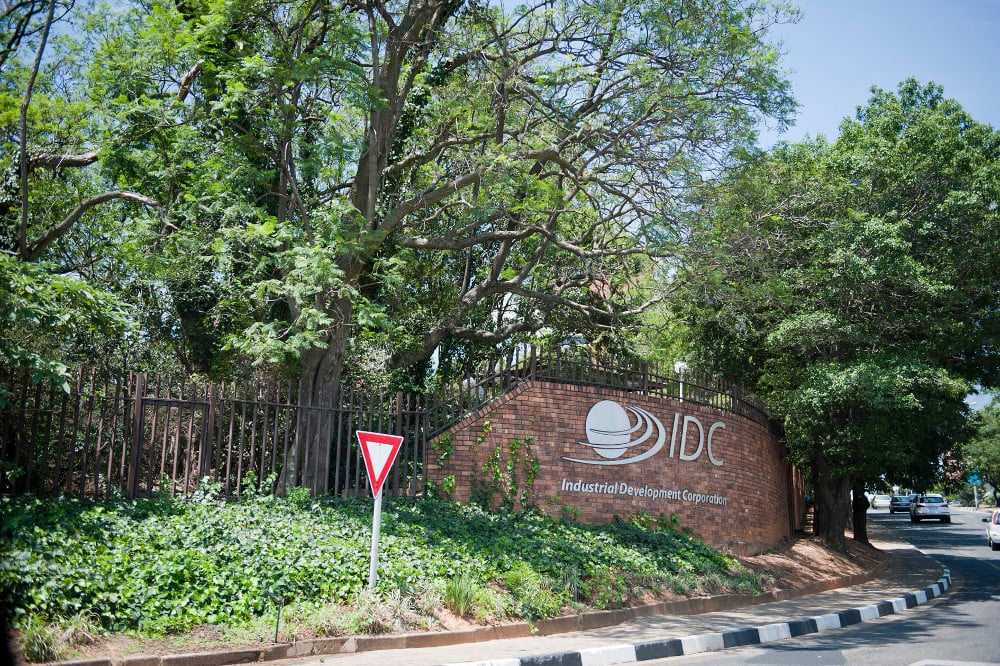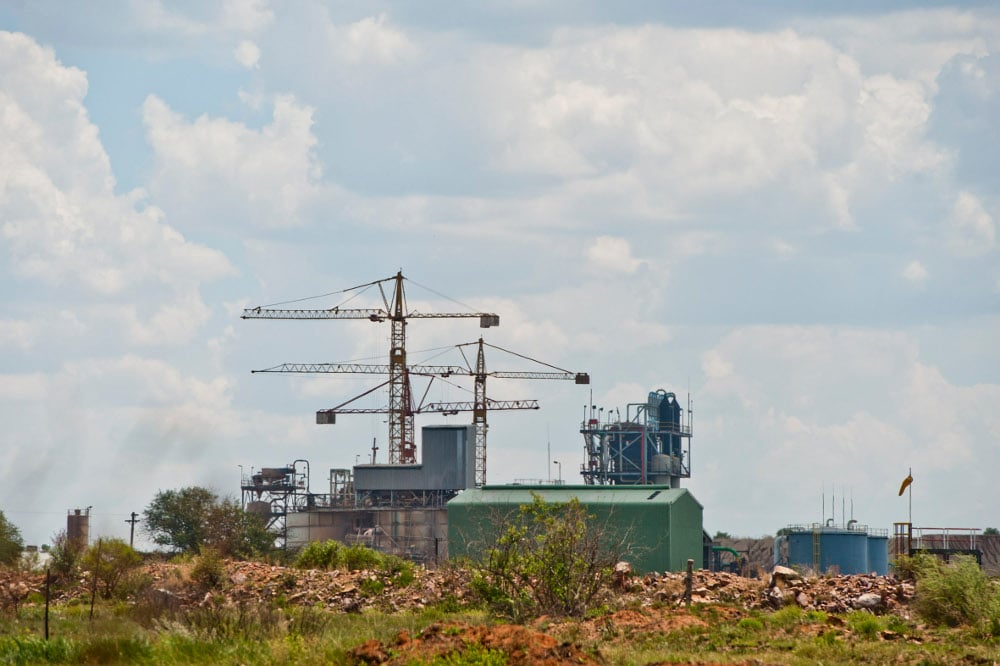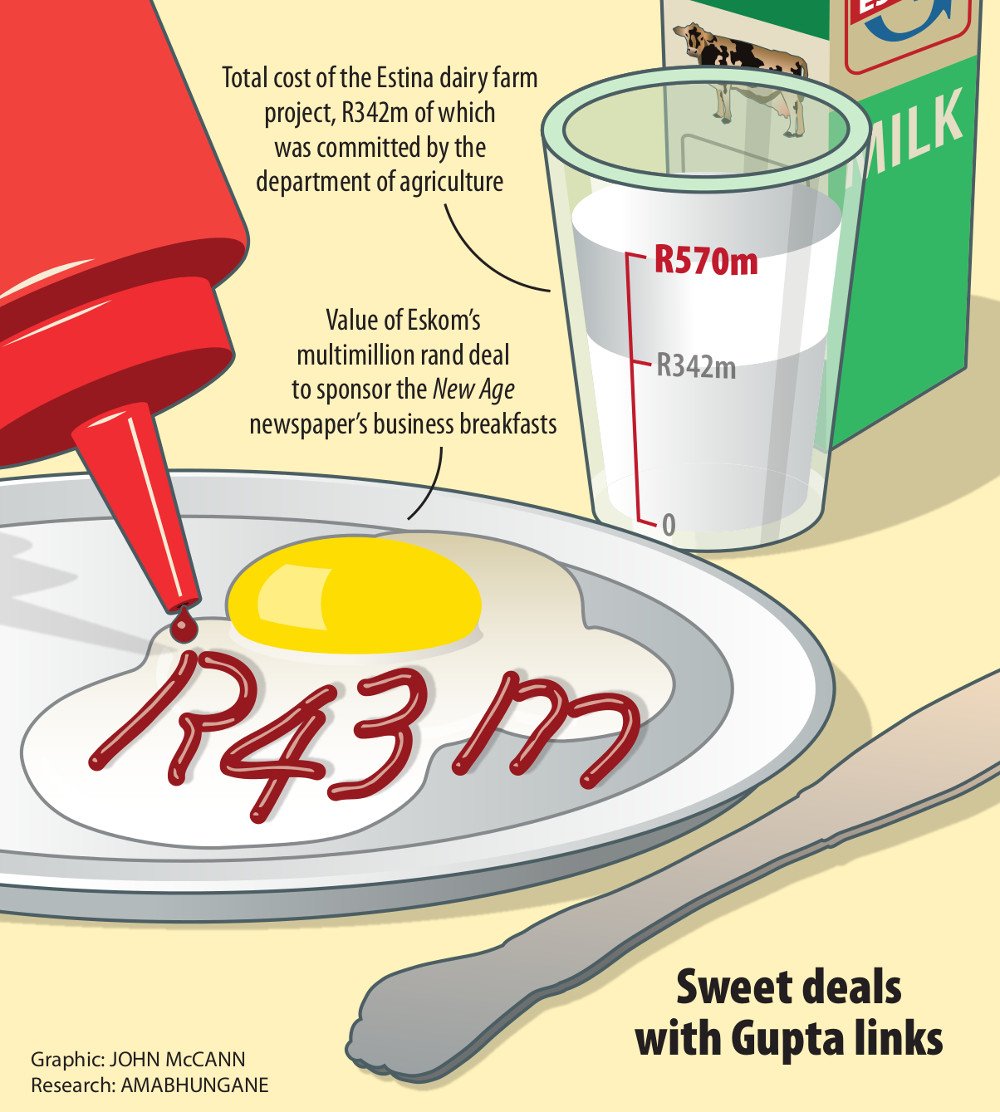Oakbay Resources and Energy chief executive George van der Merwe and chairperson Atul Gupta at the JSE listing.
Not for the first time, the politically connected Gupta family is benefiting from a deal involving a state entity. This time, the boon is particularly large – potentially about R100-million – thanks to the Industrial Development Corporation (IDC) accepting seemingly overvalued shares to settle debt that a Gupta mining company owed it.
The company, Oakbay Resources and Energy, listed on the JSE on Friday last week. The honour of blowing the horn to open trading fell to its chairperson, Atul Gupta.
He, his wife, Chetali, brother Rajesh and sister-in-law Arti own about 80% of Oakbay.
Oakbay’s main asset, and the main driver of its value, is its subsidiary Shiva Uranium. The inflation of Oakbay’s market value above the inherent value Shiva gives it, with the help of a Gupta associate in Singapore, is central to the Guptas’ benefit, which is the IDC’s potential loss.
The IDC is a state-owned development financier set up to stimulate industry and create jobs. Each loss on an investment means it is less able to fulfil its mandate on behalf of all South Africans.
The story goes back to April 2010, when Oakbay and a black economic empowerment consortium, including President Jacob Zuma’s son Duduzane and Umkhonto weSizwe veterans, bought a company they renamed Shiva from the Toronto-listed mining company Uranium One, following lengthy negotiations.
Care and maintenance
Shiva had uranium and gold properties and plants in the Klerksdorp area, but Uranium One had put them on care and maintenance 18 months before, unable to run them profitably.
The cash portion of the consideration Oakbay paid Uranium One was $37-million, then about R270-million. To fund the acquisition, Oakbay took a R250-million loan from the IDC.
Oakbay’s financials show that it, too, has not been able to maintain profitability at Shiva.
The entire debt should have been repaid by April 2013. But Oakbay’s financials state that, by the end of February this year, only R20-million had been paid and the debt with interest had grown to R399-million.

The IDC’s offices in Sandton. (Madelene Cronjé, M&G)
After negotiations, the IDC agreed in June this year to restructure the debt, including a new repayment schedule that would end in 2018.
This is the background to the Oakbay listing last week. As its pre-listing statement shows, the IDC is taking a small (about 3.6%) stake in Oakbay in place of R257-million of the total debt.
These concessions give Oakbay more breathing room. But the principal gain to Oakbay, and potentially the IDC’s loss, is obscured in the vagaries of Oakbay’s market valuation.
Interim financials
Oakbay’s interim financials at the end of August this year give the company a net asset value – the total value of its assets minus liabilities – of about R4.6-billion, which translates into an asset value of R5.74 a share.
This drops to R4.84 a share if one substitutes the mineral asset value in Oakbay’s books with the lower value put on them by the “competent person”, a valuer appointed as part of the listing requirements.
But Oakbay listed at R10 a share, which is nearly double the underlying asset value. This is significant, as it is this R10 “market” value, minus only a 10% discount, at which the IDC got shares in lieu of the R257-million debt.
How did Oakbay achieve the inflated market value?
The answer lies in Singapore, from where a company called Unlimited Electronic & Computers paid R10 a share in a private placement shortly before the listing.
But was this an arm’s-length transaction?
Unlimited, which acquired 2.3% of Oakbay, is owned by Kamran “Raj” Radiowala, Singapore company records and Oakbay’s pre-listing statement show.
Gupta association
Radiowala has been associated with the Guptas since at least 2006. Online company registration data records him being appointed managing director of an Indian electronics distribution company, SES Technologies, in 2007.
SES was co-owned by the Guptas’ South African business Sahara Computers, and its board included Ashu Chawla, one of their closest associates here.
The SES chief operating officer for some time was George van der Merwe, who held the same position at Sahara and is now the chief executive of Oakbay.
Radiowala did not reply to questions this week.

Little appears to be happening at Shiva Uranium, near Klerksdorp. (Delwyn Verasamy, M&G)
The IDC got its shares for the R257-million at R9 a share, a “discount” on the R10 value that Radiowala’s intervention had put on them.
However, compared with the underlying value of R5.74 provided by Oakbay’s own financials, or to the adjusted R4.84, the IDC gave Oakbay a discount of between R93-million and R119-million.
Whether Oakbay’s gain, which will be the IDC’s loss, materialises will depend on whether the market level will hold at R9 a share, or sink back to the underlying value, which might be standard for a mining company.
‘Speculative’ and ‘illiquid’
A mining analyst at a major investment bank this week dismissed Oakbay’s chances of maintaining market interest.
He said he had never heard of Oakbay but, once he had seen the numbers, added: “It’s small, it’s speculative, it’s illiquid. This is not the kind of thing we cover.”
But the IDC said in response to questions that “we are comfortable with the valuation of R8-billion [the total market capitalisation at R10 a share] on the basis of the potential additional value as a result of classifying a portion of the mineral resources to mineral reserves”.
It also pointed to the fact that Oakbay now, unlike at the time of the original loan, was “a cash generative asset, with an operational track record”.
But perhaps also relevant to Oakbay’s value, which at R8-billion would rival that of established miners, Shiva’s operations contrast sharply with the sprawling and frenetic operations of Anglogold Ashanti and Sibanye Gold a 100km away on the N12 highway, where gold is still the quarry and which analysts watch closely.
Although Shiva’s two Dominion shafts, its Rietkuil mine, and the nearby processing plant are all operational, they give the impression of being minimally so.
This week at the Shiva “main offices” partly up a hill above the town of Hartbeesfontein, eight cars were parked in front of the diminutive, single-storey building.
Townspeople said they had been told to brace themselves for an influx of workers and heavy equipment, but had so far seen neither. – Stefaans Brümmer, Sam Sole, James Wood, Lloyd Gedye, Lionel Faull, Craig McKune and Phillip de Wet contributed to this story
Sweet deals a recurring pattern of state favour
Oakbay’s sweetheart loan from the state-owned Industrial Development Corporation (IDC) and the partial conversion of its spiralling debt into an overvalued IDC stake in the company is part of a pattern of the state’s preferential treatment of the Gupta business empire.
Other examples are:
New Age breakfasts, subscriptions and advertising
State-owned companies, including Eskom, Transnet and Telkom, have sponsored the New Age newspaper’s regular business briefings.
These events provide a platform for government ministers and are televised live by the SABC. The sponsorships cost parastatals more than R1-million a session.
Eskom renewed its breakfast sponsorship in April this year, but auditors flagged the R43-million deal as a “reportable irregularity” in half-year financial statements. Eskom’s then interim chief executive, Collin Matjila, a Gupta associate, is under investigation for allegedly approving it without delegated authority.
Eskom previously subscribed to the New Age, until staff complained that thousands of unread copies of the newspaper had piled up at the head office.
In 2011 Siyabonga Mahlangu, an adviser to the previous public enterprises minister, strong-armed SAA into entering a more favourable subscription deal with the New Age.
The New Age‘s print advertisers are also predominantly state entities, but the newspaper does not submit its circulation figures for auditing, which means that parastatals – and, ultimately, taxpayers – cannot be sure how much bang for their buck they get.
Free State dairy
Estina, a company with many links to the Guptas, entered into a R570-million “mega private-public partnership” to set up a dairy farm with the Free State agriculture department in 2012.
The partnership agreement was drawn up by Free State Premier Ace Magashule’s legal adviser, and strongly favoured Estina by allocating most of the upfront costs to the state.
The Guptas are close to Magashule and, at one time, employed and housed his son.
Considerable funding was diverted from the province’s coffers to this project, which was rushed through without following proper due diligence or supply chain procedures, according to a treasury investigation.
Estina’s sole director was a computer salesperson with no farming background.
Fears of mismanagement at the dairy were seemingly confirmed when amaBhungane discovered the decomposing corpses of about 30 dairy cows dumped close to a river near the farm in February this year.
The Free State government cancelled its contract with Estina in April, but not before the agriculture department had poured R144-million into the project.
Waterkloof debacle
When a passenger jet from India, carrying 270 wedding guests to a Gupta family wedding, landed at the Waterkloof military airbase, to be met by senior diplomats and military top brass and escorted to the Sun City wedding venue, it was meant to be a statement of the family’s influence in their adopted country.
A government inquiry revealed that corners had been cut and rules broken by officials who bent over backwards to accommodate the unorthodox landing request.
The inquiry cleared several ministers the Guptas had interacted with over the proposed landing, and blamed officials for using President Jacob Zuma’s name to clear procedural obstacles. – Lionel Faull

Oakbay responds
Oakbay Resources and Energy this week provided a long response to questions, placing emphasis on the value that it had created since purchasing Shiva Uranium in 2010 and asserting that the Industrial Development Corporation (IDC) would get value for its money.
Oakbay said that, because of a high original interest rate on the IDC’s loan, brought down during the debt restructuring this year, it estimated that the original R250-million lent would exceed R600-million at the new expiry date in 2018, meaning “a 250% return on investment for the IDC over a seven-year period” and “more than 1?000 jobs in line with the IDC mandate”.
The conversion of R257-million of the loan to equity at R9 a share, at listing, it said, was fair value.
Oakbay’s auditors, KPMG, “have expressed an unmodified opinion thereon”, it said.
Oakbay also said the company’s market capitalisation – R8-billion at R10 a share – presented “fair value”.
This was based on the report of the “competent person” – the valuer Oakbay had to appoint as a listing condition – who gave the company’s mineral resources a “fair value of R6.2-billion” and on additional assets, such as plant and equipment, “which has a historical cost of approximately R7.5-billion and now impaired to R2-billion.
“Accordingly, the sum of the fair value of the company’s assets exceeds its current market capitalisation [of about R8-billion].”
It also said: “The listing price of the company’s shares is well supported by the independently determined fair value of its high-quality assets, and we are excited by the company’s prospects going forward.”
What Oakbay did not say, is:
- The competent person’s valuation, in fact R6.1-billion, applies to Shiva Uranium, of which Oakbay owns 74% only. As a result, Oakbay can lay claim to about R4.5-billion in mineral value only.
- The historical cost of plant and equipment is irrelevant; it is current value that counts.
- The company’s assets have to be offset by liabilities, which in Oakbay’s case, are significant. It is based on all these factors that Oakbay’s own last interim financials gave a net asset value of R4.6-billion – well below the market capitalisation or R8-billion at listing.
In response to the allegation that Kamran Radiowala, whose company Unlimited Electronic & Computers bought shares shortly before listing, was a “related party”, Oakbay said that he “is not a related party as contemplated by the JSE listing requirements”.
* Got a tip-off for us about this story? Click here.
 The M&G Centre for Investigative Journalism (amaBhungane) produced this story. All views are ours. See www.amabhungane.co.za for our stories, activities and funding sources.
The M&G Centre for Investigative Journalism (amaBhungane) produced this story. All views are ours. See www.amabhungane.co.za for our stories, activities and funding sources.